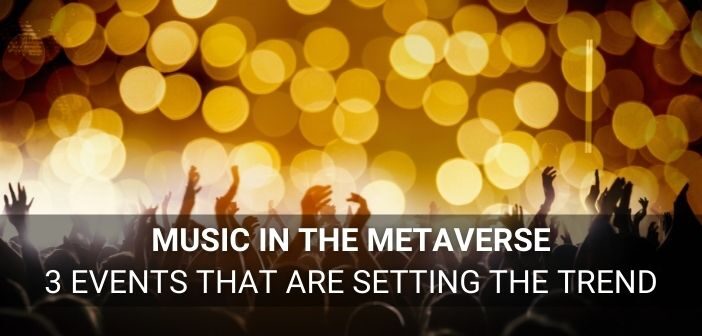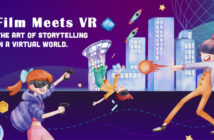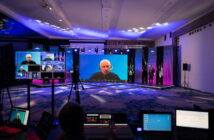As the metaverse becomes a part of popular culture, the buzz around the technology is ascending with no end in sight. The ability to enter an entirely different, yet familiar universe, only constrained by the heights of imagination, has enabled the world to go global from inside their living rooms.
Large recreational gatherings especially are dwindling in number and scale with each passing year. Fewer events, however, equal lower income for entertainers, especially those who make their living primarily from live gigs and performances. Yet, the technology threatening to take the place of live concerts and music festivals is the very solution that the industry is looking for; Music in the metaverse is not a futuristic concept at all, it has already reached critical mass and there is no looking back.
A large chunk of performers relies on live events for their income. Even then, touring comes with its own set of challenges, ranging from low commissions for artists to high production costs. On the other hand, listeners may have to wait years, and sometimes even a lifetime to be able to see their favourite artists perform live. With the help of the internet, music has erased borders decades ago; an artist can enjoy an international audience much before they make it “big”. In this scenario as well, live performances matter a lot – as it is a unique opportunity for fans and idols to meet and interact.

Image Credits: C.Castilla from Adobe Stock
Music in the metaverse can address problems on both fronts, making it easier for listeners to tune into live events across the world, and giving musicians the perks of a tour without the logistic costs. The last two years have witnessed a slew of high profile metaverse music events, catalyzed by the global pandemic. The accelerated uptake of the trend has been made possible by parallel changes, especially sustained remote working from virtual offices and marketing in the metaverse.
With a maelstrom of new experiences of music in the metaverse entering the scene, here’s a list of exciting developments and events you need to know about:
Metaverse Concerts – Travis Scott x Fortnite
Fortnight, a battle royale game that has captivated everyone since 2017, has quickly transformed from an online multiplayer to one of the first proto-metaverse in the public eye. The tens of millions of active players that make up the game’s audience represent an interesting consumer base. Technological avid and explorative, the youthful audience that populates the game’s servers is also one of the most active music listening customer segments of today’s musical artists.
So much so that Travis Scott, one of the world’s most recognisable hip-hop icons, released an entire album along with an in-game live concert for the game’s players. This one of a kind gimmick helped Fortnite reach its higher concurrent active user count of more than 12.3 million views from across the world.

Image Credits: Roman Rvachov from Adobe Stock
This certainly was not the first time a metaverse concert was held, but this event was the first that was ever done by a mainstream artist at such a grand stage. This concert highlighted a couple of key undercurrents that had been already shaping the world. Firstly, a metaverse based concert implies that there is no physical constraint on the number of viewers, nor their location, i.e, artists can reach their entire audience while performing concerts. Secondly, most people play video games to a certain degree and are engrossed enough in them to wish to spend money on virtual merchandising.
Developers of Fortnite developed special skins for players to purchase in-game to celebrate the events and the sales earned both Travis and Epic Games a sum in millions. Metaverse merchandising has already shown positive results and this is only one of the examples of it.
Metaverse Music Festival – EDC x Roblox
Another proto-metaverse that has gained a massive user base comes from video games as well. Roblox, a sandbox world where users can create their own worlds and games to interact with each other. This month, the famous Las Vegas music festival EDC (Electric Daisy Carnival) paired up with Roblox to bring their music festival to a virtual global audience by hosting the Insomniac World Party, a week-long in-game event for players around the world to enjoy for free. All the performances by various artists were shown live in-game across four stages and in addition to that there was bonus content and mini-games for players who attended it.

Image Credits: satura_ from Adobe Stock
Metaverse music festivals will be the future of hosting music festivals. Apart from the exciting aspects such as concerts with no physical limitations for theatrics and one-click accessibility, the virtual nature of these events means that there are far lower costs involved in hosting such events. The entire ecosystem of people that are involved in hosting and running a music festival benefit from it, as well it allows for smaller “crews” to host their own music festivals. Apart from the relief to the people involved and attendees, the very planet benefits from it as the environmental cost of such events is extremely high.
Virtual Concert Platform – Lindsey Stirling x Wave VR
Even before the pandemic pushed the world online, some artists and entrepreneurs were cognizant of the physical constraints and their consequences for both artists and audiences. Wave, a virtual-reality based startup that focused on connecting artists with their fans through virtual metaverse performances, had predicted the oncoming demand for such experiences and already acquired funding before the beginning of the Covid era. One of the many artists who used Wave’s platform for hosting their metaverse live performance was Lindsey Sterling, a contemporary violinist with a lot of internet fame.
With a small production crew and a tiny ensemble of equipment, Lindsey was able to produce a live performance in virtual reality that reached more than 400,000 users across multiple platforms. In physical reality such an experience is neither possible nor can it ever generate the kind of viewership due to physical constraints, which makes metaverse music ideal for artists with both small and large audiences.

Image Credits: kegfire from Adobe Stock
Just like the digital transformation that preceded the oncoming metaverse revolution, the newer technology holds the key to fixing many of the pre-existing issues that plague multiple facets of human life – from education to surgery. Metaverse not only lifts away the physical constraints but also reduces the reliance on resources while making experiences easier to access for everyone, from everywhere.




